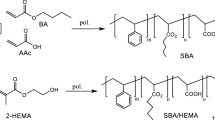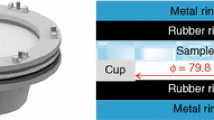Abstract
Two methods were used to prepare polysiloxane-functionalized acrylic latexes via emulsion polymerization. Ethyl acrylate and 2-ethylhexyl acrylate were used in both methods as acrylic phase. In the first method, an acrylic core was prepared with addition of a coupling agent, 3-(trimethoxysilyl) propyl methacrylate, after which cyclic siloxane monomer (octamethylcyclotetrasiloxane) was reacted with the coupling agent. In the second method, a silane-terminated polysiloxane (H-PDMS) was reacted with ethylene glycol dimethacrylate, and then copolymerized with ethyl acrylate and 2-ethylhexyl acrylate in a batch emulsion polymerization. Particle size distribution and particle morphology were evaluated by using dynamic light scattering (DLS) and transmission electron microscopy (TEM), respectively. Core-shell morphology was observed in TEM for the first preparation method as proposed. After film formation, surface tension, morphology and dynamic mechanical properties were investigated. Stratification of polysiloxane was examined by Fourier-transform infrared spectroscopy (FT-IR) and energy dispersive X-ray (EDX). Energy dispersive X-ray data indicated that only the second preparation method had higher silicon content at film-air interface than film-substrate interface. In both methods, storage modulus and surface energy of latex films decreased after grafting polysiloxane.










Similar content being viewed by others
References
Guyot A, Landfester K, Schork FJ, Wang C (2007) Prog Polym Sci 32:439–1461
Lin M, Chua F, Guyot A, Putaux J-L, Bourgeat-Lami E (2005) Polymer 46:1331–1337
Zou M, Wang S, Zhang Z, Ge X (2005) Eur Polym J 41:2602–2613
Stoye D, Freitag W (eds) (1998) Paints, coatings and solvents, 2nd edn. Wiley-VCH, Weinheim, pp 37–39
Wagener KB, Zuluaga F, Wanigatunga S (1996) Trends in Polym Sci 4:157–163
Zou M, Huang F, Nie J, Zhang Z (2005) Ge X. Polym Int 54:861–869
Lee Y, Akiba I, Akiyama S (2003) J Appl Polym Sci 87:375–380
Landfester K, Pawelzik U, Antonietti M (2005) Polymer 46:9892–9898
Kan CY, Liu DS, Kong XZ, Zhu XL (2001) J Appl Polym Sci 82:3194–3200
Kan CY, Zhu XL, Yuan Q, Kong XZ (1997) Polym Adv Tech 8:631–633
Pratt SL, Lucas GM. US Patent 5216057
Reddy PN, Subbaiah A, Gupta S. Chatterji PR, US Patent 2004/0162399.
Kan CY, Kong XZ, Yuan Q, Liu DS (2001) J Appl Polym Sci 80:2251–2258
He W-D, Pan C-Y (2001) J Appl Polym Sci 80:2752
Hill LW (1995) Dynamic mechanical and tensile properties. In: Koleske JV (ed) Paint and coating testing manual. ASTM, Philadelphia, pp 534–46
Gu Q, Lin Q, Hu CL (2005) J Appl Polym Sci 95:404
Peters ACIA, Overbeek GC, Buckmann AJP, Padget JC, Annable T (1996) Prog Org Coat 29:183–194
Furukawa N, Yamada Y, Furukawa M, Yuasa M, Kimura Y (1997) J Polym Sci Part A Polym Chem 35:2239–51
Fox T (1956) Bull Am Phys Soc 1:123
Satoh K, Urban MW (1996) Prog Org Coat 29:195–199
Patel NM, Dwight DW, Hedrick JL, Webster DC, McGrath JE (1988) Macromolecules 21(9):2689–2696
Williams TR (1986) J Appl Polym Sci 31:1293–1308
Adams JL, Quiram DJ, Graessley WW, Register RA, Marchand GR (1996) Macromolecules 29:2929–2938
Dingenoutsand N, Ballauff M (1999) Langmuir 15:3283–3288
Sung PH, Lin CY (1997) Eur Polym J 33:903–906
Ozdeger E. US Patent 6420480.
Cao S, Liu B, Deng X, Luo R, Chen H (2007) Polym Int 56:357–363
Smith WV, Ewart RW (1948) J Chem Phys 16:592
Delgado J, El-Aasser MS, Silebi CA, Vanderhoff JW (1987) Polym Mat Sci Eng 57:976
Capek I (2001) Adv Colloid Interface Sci 91:295–334
Chern C-S, Lin C (2000) H Polymer 41:4473–4481
Barrere M, Ganachaud F, Bendejacq D, Dourges MA, Maitre C, Hemery P (2001) Polymer 42:7239–7246
Racles C, Ioanid A, Toth A, Cazacu M, Cozan V (2004) Polymer 45:4275–4283
Author information
Authors and Affiliations
Corresponding author
Rights and permissions
About this article
Cite this article
Bas, S., Soucek, M.D. Optimization and comparison of polysiloxane acrylic hybrid latex synthesis methods. J Polym Res 19, 9907 (2012). https://doi.org/10.1007/s10965-012-9907-4
Received:
Accepted:
Published:
DOI: https://doi.org/10.1007/s10965-012-9907-4




